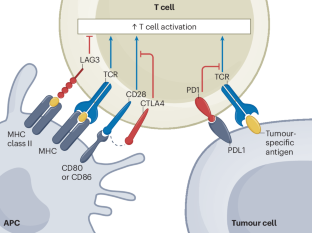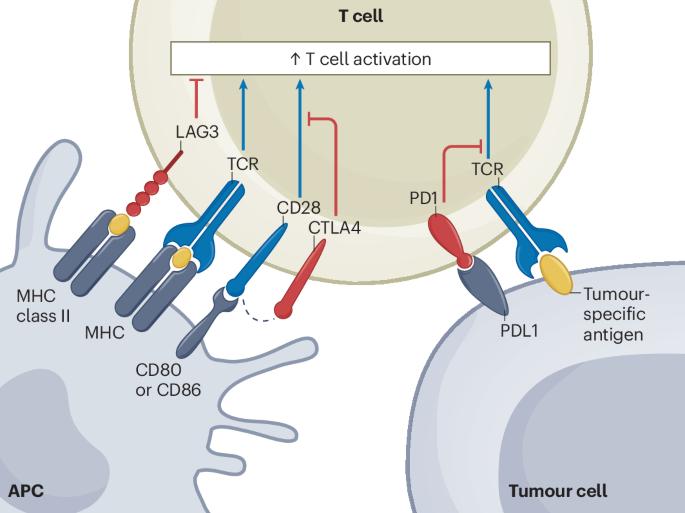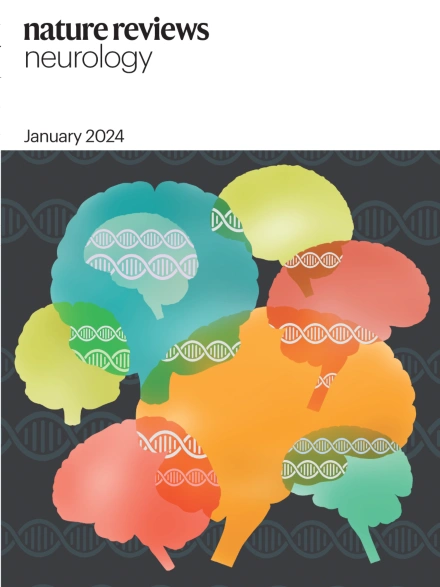Peripheral nervous system immune-related adverse events due to checkpoint inhibition
IF 28.2
1区 医学
Q1 CLINICAL NEUROLOGY
引用次数: 0
Abstract
Immune checkpoint inhibitors have revolutionized cancer therapy and are increasingly used to treat a wide range of oncological conditions, with dramatic benefits for many patients. Unfortunately, the resulting increase in T cell effector function often results in immune-related adverse events (irAEs), which can involve any organ system, including the central nervous system (CNS) and peripheral nervous system (PNS). Neurological irAEs involve the PNS in two-thirds of affected patients. Muscle involvement (immune-related myopathy) is the most common PNS irAE and can be associated with neuromuscular junction involvement. Immune-related peripheral neuropathy most commonly takes the form of polyradiculoneuropathy or cranial neuropathies. Immune-related myopathy (with or without neuromuscular junction involvement) often occurs along with immune-related myocarditis, and this overlap syndrome is associated with substantially increased mortality. This Review focuses on PNS adverse events associated with immune checkpoint inhibition. Underlying pathophysiological mechanisms are discussed, including antigen homology between self and tumour, epitope spreading and activation of pre-existing autoreactive T cells. An overview of current approaches to clinical management is provided, including cytokine-directed therapies that aim to decouple anticancer immunity from autoimmunity and emerging treatments for patients with severe (life-threatening) presentations. Some patients who are treated with checkpoint inhibitors experience peripheral nervous system (PNS) immune-related adverse events (irAEs). O’Hare and Guidon describe the spectrum of PNS irAE phenotypes, discuss their underlying mechanisms and outline a consensus-based, pathophysiology-driven approach to their clinical management.


检查点抑制剂导致的外周神经系统免疫相关不良事件
免疫检查点抑制剂彻底改变了癌症疗法,越来越多地用于治疗各种肿瘤疾病,给许多患者带来了巨大的益处。不幸的是,T细胞效应器功能的增强往往会导致免疫相关不良事件(irAEs),这些不良事件可能涉及任何器官系统,包括中枢神经系统(CNS)和外周神经系统(PNS)。三分之二的受影响患者的神经系统不良事件涉及 PNS。肌肉受累(免疫相关肌病)是最常见的 PNS irAE,可能与神经肌肉接头受累有关。免疫相关周围神经病变最常见的形式是多发性神经元病变或颅内神经病变。免疫相关性肌病(伴有或不伴有神经肌肉接头受累)通常与免疫相关性心肌炎同时发生,这种重叠综合征与死亡率大幅上升有关。本综述侧重于与免疫检查点抑制相关的 PNS 不良事件。其中讨论了潜在的病理生理学机制,包括自身与肿瘤之间的抗原同源性、表位扩散和原有自反应 T 细胞的激活。综述了目前的临床治疗方法,包括旨在使抗癌免疫与自身免疫脱钩的细胞因子导向疗法,以及针对重症(危及生命)患者的新兴疗法。
本文章由计算机程序翻译,如有差异,请以英文原文为准。
求助全文
约1分钟内获得全文
求助全文
来源期刊

Nature Reviews Neurology
医学-临床神经学
CiteScore
29.90
自引率
0.80%
发文量
138
审稿时长
6-12 weeks
期刊介绍:
Nature Reviews Neurology aims to be the premier source of reviews and commentaries for the scientific and clinical communities we serve. We want to provide an unparalleled service to authors, referees, and readers, and we work hard to maximize the usefulness and impact of each article. The journal publishes Research Highlights, Comments, News & Views, Reviews, Consensus Statements, and Perspectives relevant to researchers and clinicians working in the field of neurology. Our broad scope ensures that the work we publish reaches the widest possible audience. Our articles are authoritative, accessible, and enhanced with clearly understandable figures, tables, and other display items. This page gives more detail about the aims and scope of the journal.
 求助内容:
求助内容: 应助结果提醒方式:
应助结果提醒方式:


